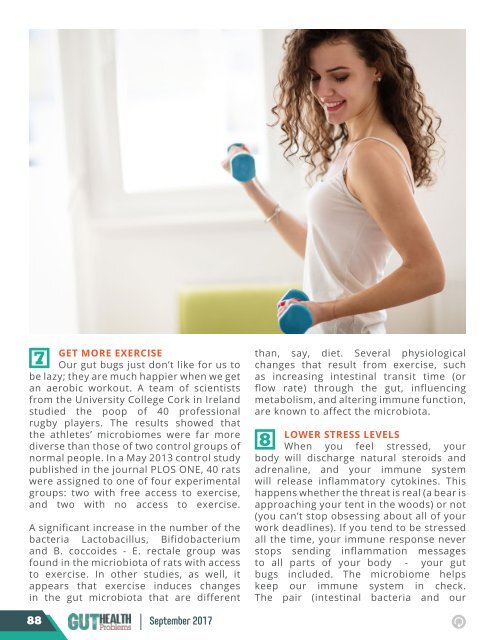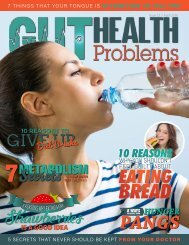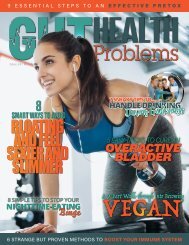Gut Health Problems - September 2017
In the eighth issue of Gut Health Problems, we have an overview of the vast benefits of probiotics, a checklist of foods rich in zinc, an intro to determining if you have fiber deficiency, and more. Intestinal discomfort, whether chronic or occasional, is something worth taking the time to prevent. And while we all have those foods that give us problems, you may actually be able to make a change that makes a bigger difference than you ever imagined.
In the eighth issue of Gut Health Problems, we have an overview of the vast benefits of probiotics, a checklist of foods rich in zinc, an intro to determining if you have fiber deficiency, and more. Intestinal discomfort, whether chronic or occasional, is something worth taking the time to prevent. And while we all have those foods that give us problems, you may actually be able to make a change that makes a bigger difference than you ever imagined.
You also want an ePaper? Increase the reach of your titles
YUMPU automatically turns print PDFs into web optimized ePapers that Google loves.
7<br />
GET MORE EXERCISE<br />
Our gut bugs just don’t like for us to<br />
be lazy; they are much happier when we get<br />
an aerobic workout. A team of scientists<br />
from the University College Cork in Ireland<br />
studied the poop of 40 professional<br />
rugby players. The results showed that<br />
the athletes’ microbiomes were far more<br />
diverse than those of two control groups of<br />
normal people. In a May 2013 control study<br />
published in the journal PLOS ONE, 40 rats<br />
were assigned to one of four experimental<br />
groups: two with free access to exercise,<br />
and two with no access to exercise.<br />
A significant increase in the number of the<br />
bacteria Lactobacillus, Bifidobacterium<br />
and B. coccoides - E. rectale group was<br />
found in the micriobiota of rats with access<br />
to exercise. In other studies, as well, it<br />
appears that exercise induces changes<br />
in the gut microbiota that are different<br />
than, say, diet. Several physiological<br />
changes that result from exercise, such<br />
as increasing intestinal transit time (or<br />
flow rate) through the gut, influencing<br />
metabolism, and altering immune function,<br />
are known to affect the microbiota.<br />
8<br />
LOWER STRESS LEVELS<br />
When you feel stressed, your<br />
body will discharge natural steroids and<br />
adrenaline, and your immune system<br />
will release inflammatory cytokines. This<br />
happens whether the threat is real (a bear is<br />
approaching your tent in the woods) or not<br />
(you can’t stop obsessing about all of your<br />
work deadlines). If you tend to be stressed<br />
all the time, your immune response never<br />
stops sending inflammation messages<br />
to all parts of your body - your gut<br />
bugs included. The microbiome helps<br />
keep our immune system in check.<br />
The pair (intestinal bacteria and our<br />
88<br />
<strong>September</strong> <strong>2017</strong>

















